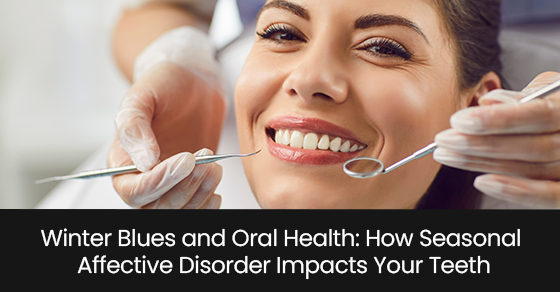
For many Canadians, winter blues feel like an inevitable part of the coldest, darkest months in our country. About 15% of Canadians experience the winter blues, according to the Mood Disorders Association of Ontario.
For 2% to 6% of those individuals, the blues take the form of seasonal affective disorder (SAD). This is a type of depression associated with the changing of the seasons. It affects your well-being and your oral health.
It’s fairly common to experience at least a few days of winter blues as the days shorten, daylight hours plummet, and temperatures descend. Your body isn’t getting as much vitamin D in the winter months, which has a direct effect on your mood. While many people bounce back quickly from these spikes of sadness, other individuals struggle to feel like their ordinary selves for much longer.
Prolonged winter blues is a sign of SAD. This is a form of depression triggered by the reduced natural sunlight and decreased daylight hours. The change in light exposure is believed to disrupt our internal body clocks, alter neurotransmitter levels in the brain, and lower vitamin D levels.
Unlike other types of depression, which occur at any time of year, SAD is linked to the specific transition between sunny summer days to the dark and cold months of winter. However, the symptoms are the same.
Seasonal affective disorder is a type of depression. Therefore, the symptoms that accompany SAD mirror those of non-seasonal depressive episodes, including the following:
Depression often leads to a breakdown of your habits and routines. It becomes harder to do the things that you’re used to doing without a second thought. You’re less motivated, less interested, and have reduced physical and mental energy. For example, exercising, performing at work, eating healthy, and taking care of your teeth and gums can all be affected by SAD.
If you experience SAD during the long winter months in Ontario, you probably already know all of these things. Our team at Oakville Place Dental is very sympathetic to our patients that are affected by the prolonged winter blues, and we’re here to help however we can.
That being said, we strongly encourage you to do your best to stick to your oral hygiene regime. The sun will return and when it does, you don’t want a new cavity to arrive with it.
Do your best to continue brushing your teeth twice a day and flossing once daily. Ask a friend or family member to help you maintain this essential oral care habit.
SAD heightens your stress, resulting in high levels of cortisol in your body. Heightened cortisol over a prolonged period is very detrimental to your overall health, including your oral health. For instance, cortisol is associated with bone loss. This can impact the bones supporting your oral cavity, such as your jawbones.
Furthermore, cortisol can also change the bacteria ratios in your mouth, resulting in an increased likelihood that you will develop tooth decay and other oral health conditions.
Those experiencing SAD are also more likely to grind their teeth. Bruxism is the technical term for the involuntary clenching or grinding of the teeth, which can occur during the day or night. It’s often brought on by stress, hence why it can accompany other symptoms of SAD.
Bruxism is very bad for your oral health, especially over a long period of time. It can damage your teeth with cracks, fractures, and uneven wear. Additionally, bruxism can cause jaw pain, intense headaches, bite issues, and damage to veneers.
There is no shame in taking medication to help you manage depression. For many Ontarians, antidepressant medication is, quite literally, a life-saver. It can give you your life back and help you feel like your usual self once again. Medication can be a short or long-term solution. Please don’t hesitate to talk to your doctor about this.
If you do decide to take an antidepressant, please inform your oral care team at Oakville Place Dental. Antidepressants are a wonderful tool for supporting your mental health and bolstering your mood, but they can be tricky on your oral health.
Some patients begin grinding their teeth or experiencing dry mouth as a result of their antidepressant medication. Like we said, teeth grinding (or bruxism) is detrimental for your oral health because it can damage your teeth. Since this will likely occur at night, you may not know that you’re even doing it until you wake up with jaw and tooth pain.
Oakville Place Dental provides a range of high-quality dental services to all our patients. Our Oakville dentists are highly experienced, knowledgeable, and compassionate—exactly what you need if you’re experiencing the winter blues!
You’ll be welcomed to our clinic with a smile, then receive the best oral care available in Ontario. Feel free to contact us with any questions or to book your next appointment. Our friendly team is ready and happy to assist you.
To make an appointment with our dentist in Oakville, call Oakville Place Dental at 905-842-6030 or contact us here.
 0 Comment
0 Comment